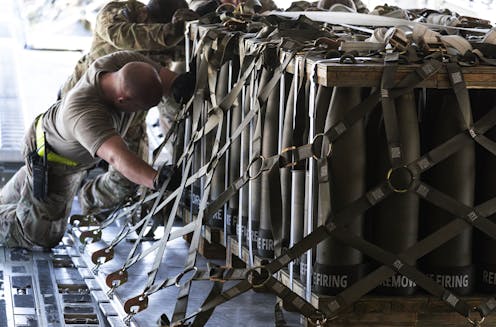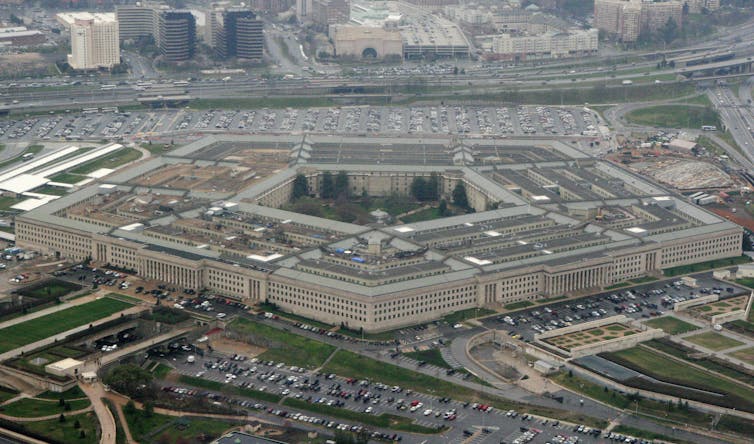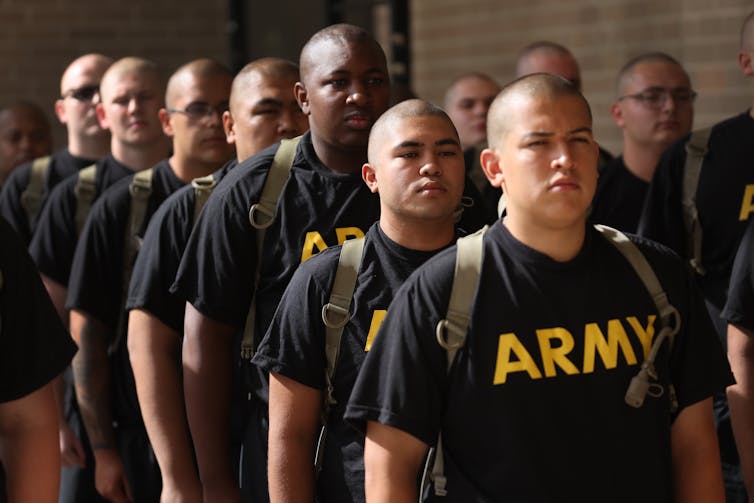Secretary of defense must perform a ‘delicate dance’ between the president, Congress and the public
Leading the US Defense Department is a massive job, broadly affecting Americans’ security at home and abroad and overseeing huge numbers of people and immense amounts of money.

Senate confirmation hearings are slated to begin on Jan. 14, 2025, for Pete Hegseth, whom President-elect Donald Trump has chosen to serve as the next secretary of defense. It’s a massive job, broadly affecting Americans’ security at home and abroad and overseeing huge numbers of people and immense amounts of money.
The Conversation U.S. asked Evelyn Farkas, a longtime Defense Department leader who is now executive director of the McCain Institute at Arizona State University, to explain what the secretary of defense’s job entails and what makes a person effective at that job. During the Obama administration, Farkas was a deputy assistant secretary of defense with a focus on Russia, Ukraine and Eurasia. Prior to that, she was a civilian adviser to the top military officer in NATO, and earlier still she was a senior staff member of the Senate Armed Services Committee, which oversees the military. She also served as a professor at the U.S. Marine Corps Command and Staff College.
What does the secretary of defense do?
They’re responsible for about 3.4 million people, including 1.2 million active duty service members and 1.3 million reservists, as well as about 900,000 civilian employees. The secretary is responsible for making sure those people are able to do their jobs – which, collectively, is to defend the United States, the American people and U.S. interests.
They’re responsible for defense policy, spending and operations, which includes the people, property and equipment at about 500 military bases across all 50 states and another 750 or so bases in 80 countries around the world. They’re responsible for budgeting and spending almost US$2 trillion a year in federal funds, which is about 16% of the overall federal budget.

What is the secretary’s role in commanding the nation’s military forces?
The president is the commander in chief and decides when and how to use the military. But the president’s decision to use force relies on advice and recommendations from the secretary of defense and the chairman of the Joint Chiefs of Staff. The president orders the secretary to carry out military operations, and the orders pass down from the secretary to the relevant commanders from there.
What is an average day or week for the secretary of defense?
The secretary sets the vision and tone for the Department of Defense and helps the president develop his or her defense strategy, and then implements that strategy. The secretary also designs and implements policies to advance the strategy and the overall national security objectives of the president.
The Defense Department’s responsibility is focused on the use of the military, whether it’s to deter attacks or defend American interests. The secretary must make sure the military is equipped and trained – ready – to fight and win the nation’s wars and to conduct any other operations, such as humanitarian, counterterrorism or peace operations.
The secretary sets priorities, which are reflected in the department’s budget. The budget has to be negotiated with Congress, of course. Day to day, the secretary is holding meetings with people who are charged with managing different aspects of the department’s activity. This happens regularly in the Pentagon or when the secretary visits military units and installations in the U.S. or around the world.
There are undersecretaries for policy and the budget and other functions such as personnel and readiness. Then there are service secretaries, who look at all of those issues but only for one specific service – the Army, the Navy, which includes the Marine Corps, and the Air Force, which includes the Space Force.

Does the president talk to the secretary of defense regularly?
It depends on the president. Most presidents have regular meetings with their top officials as a Cabinet, as a group, and then, of course, individually. Some presidents will have a standing lunch with their Cabinet members, or just a formal meeting.
Generally speaking, most presidents would seek to have a meeting at least once a week that involves their secretary of defense. There’s a lot going on in the world, and most of the events or crises involve some decision about the use of military force or some effect on defense capabilities.
How does the secretary of defense affect regular Americans’ lives?
The secretary’s involvement in a decision to use nuclear weapons would certainly affect almost every American. So that’s one way, and any decisions involving war could potentially affect any given American.
Short of that, the economic ripple effects of decisions the secretary makes could be national. The defense budget is large, but not enough to affect everyone all at the same time. But for example, if the secretary of defense decides to close a base, that would have impact on most people in that community, if not all of them, at least indirectly. Businesses would have to adjust or close, and the military personnel and their families would have to move. And the political leadership of the community would be empowered to make decisions about the civilian use of properties previously owned by the Department of Defense.
Almost every kind of company does business with the Department of Defense, either directly or indirectly. The commissaries stock food and medicine and all sorts of regular items that the military buys, in addition to equipment for fighting.
And then there’s research and development. Historically, the Defense Department has put a lot of money into those efforts, which has had a lot of effect on consumers’ lives. It’s not just the internet, although that’s one example of something that was invented for military purposes and then translated into civilian use. A lot of smaller developments happen, too, because when a lot of money is being poured into innovation, they discover things along the way that can be commercialized.
Nowadays the civilian sector has outpaced the Defense Department in terms of research and development and innovation, but the defense dollars still make a big difference.
What personal or professional attributes make for an effective defense secretary?
I worked for four of them, three directly. Robert Gates had a high sense of empathy and lots of prior government experience. Leon Panetta had an acute sense of humor and a direct but funny way of interacting. He also had the advantage of having held multiple high-level jobs in other parts of the government. Chuck Hagel had a direct line to the Senate, and Ashton Carter was a hard-driven expert.
The most useful attributes include honesty, empathy, a sense of humor, a sharp intellect, the ability to learn quickly and the skill to determine what is important quickly. Of course, prior government experience working with the department is invaluable. It’s helpful to have an understanding of how the Defense Department works, with all its components, and its strengths and weaknesses, before you get into the job. The department has a military and civilian bureaucracy, and it takes some savvy work to get it to move quickly to implement the president’s strategy.
During the confirmation process, like all nominees, the secretary is required to attest in writing and sometimes verbally that they will provide truthful answers to Congress and that they will be responsive when Congress has questions.
Different secretaries do a better job at that than others. Secretary Donald Rumsfeld often would annoy members of Congress because he knew there was a time limit on his ability to speak and on each senator’s ability to speak. So he would just speak until the clock ran out, and that made them mad. He wouldn’t always answer questions directly and sometimes came off as arrogant.
The interactions with Congress are this delicate dance, because a secretary wants to protect the prerogatives of the president and the executive branch. But Congress pays the bills, provides any new authorities the secretary might be seeking and can curtail both the authority and the budget. A secretary wants to defend the policies, the budget and the actions of the Department of Defense. But they also want to be respectful of Congress’ role and responsibilities and the individual members of Congress.
Sometimes that balance is hard to strike. They’re in a really demanding job, and they get called to testify in front of Congress, usually with the TV cameras on. Members of Congress aren’t always polite, so it takes a lot of patience and self control on the part of the secretary of defense to successfully maintain good relations, public and private, with members of Congress.
What do the American people deserve from a defense secretary?
The secretary should be someone who will stand up for the military and civilians in the department and demand from the president and Congress the resources needed to execute their mission and to provide for the well-being of the personnel, who are, after all, Americans.
I would also say a secretary should interact with the media in a way that strikes the right balance between informing the American public about what the department and the military are doing in the name of the American people and protecting national security secrets. At the end of the day, the secretary of defense is working for the American people in their interest and that of the nation.
This story is part of a series of profiles of Cabinet and high-level administration positions.
Evelyn Farkas does not work for, consult, own shares in or receive funding from any company or organization that would benefit from this article, and has disclosed no relevant affiliations beyond their academic appointment.
Read These Next
AI’s growing appetite for power is putting Pennsylvania’s aging electricity grid to the test
As AI data centers are added to Pennsylvania’s existing infrastructure, they bring the promise of…
Why US third parties perform best in the Northeast
Many Americans are unhappy with the two major parties but seldom support alternatives. New England is…
Abortion laws show that public policy doesn’t always line up with public opinion
Polls indicate majority support for abortion rights in most states, but laws differ greatly between…





